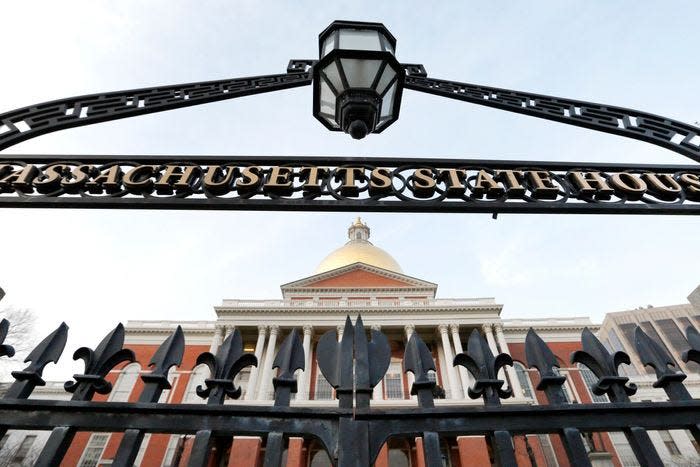Testing for lead in water at Mass. schools is voluntary. Some say that's the problem
BOSTON — Birgit Claus Henn was called to Holliston in 2017 after residents there reported discolored tap water in their homes amid reports that several children were experiencing kidney problems and learning disabilities.
Residents had hoped that an expert such as Henn, an environmental epidemiologist, could figure out what was happening.
Henn, also an Boston University environmental health associate professor, and other experts determined that the town’s public drinking water system contained various contaminants, including lead, barium and manganese, all of which can have adverse health effects on children.
As Massachusetts has no law requiring schools to prevent lead contamination in their water, advocates and legislators, including state Sen. Joan Lovely, D-Salem, and state Rep. Kate Lipper-Garabedian, D-Melrose, are pushing for bills that would implement mandatory health protections against lead in drinking water at both schools and child care centers.

Baby teeth analysis: BU researcher advances cutting-edge tech in Holliston drinking water studies
“We know that most of the (tested) schools and child care centers … have tested positive for lead,” Deirdre Cummings, legislative director of environmental advocacy group MASSPIRG, said during a recent hearing of the Legislature’s Committee on Environment and Natural Resources. “We have no mandatory testing, prevention or remediation requirements for lead in drinking water at schools or child care centers.”
Since 2016, more than 80% of taps tested in more than 1,700 Bay State schools and child care centers contained lead, according to Department of Environmental Protection data cited by MASSPIRG.
“As a former public school teacher and mother to two school-aged sons, I am proud to have filed this legislation to promote the health and safety of students and teachers across the Commonwealth,” said Lipper-Garabedian, in a statement. “I’m glad to be working with Sen. Lovely, MASSPIRG, Environment Massachusetts, the Massachusetts PTA, and others to press for health-based standards that ensure safe water for students and educators in our schools and child care centers."
In Framingham, only four of 19 city schools have been tested for lead by the state since January 2022.
Here’s what legislation requiring lead remediation at schools would look like and why:
Health effects of lead in drinking water
Cummings said it’s especially important to implement protections for children as they are particularly vulnerable to lead, even at low exposure levels.
Henn said contaminants such as lead, copper and manganese are neurotoxins that can harm the neurological development of children.
“Lead and copper continue to be an issue, and manganese is not just in Holliston; it’s in many communities,” Henn said in an interview. “It can be naturally occurring or anthropogenic because of industrial activities… but ultimately, it's elevated levels in the drinking water.”
According to the Environmental Protection Agency, exposure to lead can also cause lowered IQ, hyperactivity, stunted growth, hearing problems and anemia in children.
Installing lead filtrations at drinking water outlets
Mandatory health protections would require schools and child care centers to install and maintain lead filters, according to bills filed by Lovely and Lipper-Garabedian.
Cummings said some school districts have already voluntarily installed lead filters in drinking water outlets. She said that although it’s a simple and inexpensive preventative method, it's not something every school has done.
“I think there's a fear that this is going to be this huge expense, and the reality it's not,” Cummings said. “When you then think about what's the expense … I couldn’t say that it’s not (an expense), but compare it to someone’s lifelong learning disabilities as a result of exposure.”
Cummings added there are state resources that help schools counter the cost of lead filters, including the School Water Improvement Grants program. Massachusetts launched the program in 2020, aiming to provide grant funding for schools and childcare facilities to install water filters.
Increased testing and monitoring of school drinking water
Legislation would also require schools and child care centers to annually test drinking water outlets for elevated lead levels.
Henn said that during her time researching the public water system in Holliston, she found that the frequency with which water was tested and data about water contaminant levels were “relatively sparse,” both for Holliston and the state.
“It's monitored, and yes, it's measured, but it's done less often than I would argue it should be done,” Henn said. “With a regulation, drinking water suppliers would be required to meet that level that's actually safe for everyone's health.”
Cummings said although the DEP offers to test lead levels in schools and child care facilities, it's a voluntary program. So not all schools get tested.
“The program itself is very good, they're rigorous, they have good testing methodologies, the advice that the DEP gives is great,” Cummings said. “The problem is that the program is voluntary.”
Mandatory health protection legislation would require schools to test their water contaminant levels on a regular basis, as well as make water quality results available to the public.
“No matter if you're from the Cape, or the Berkshires, or from Lowell, or New Bedford,” Cummings said. “It will be for all kids who go to school in Massachusetts or in a child care center.”
This article originally appeared on MetroWest Daily News: MA advocates seek required testing for lead in water at schools

